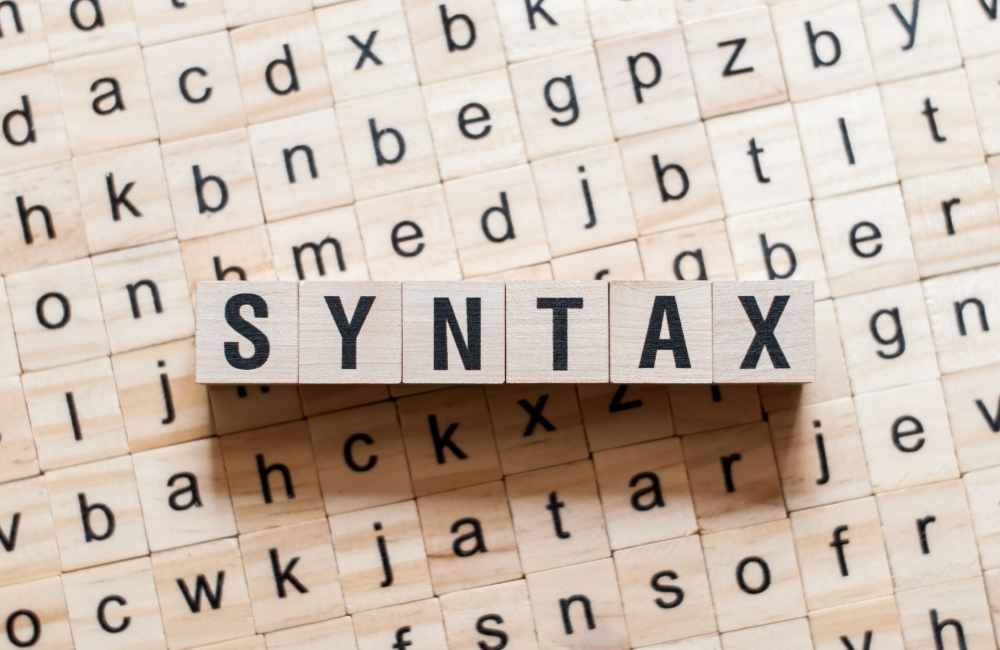Literary Syntax

Syntax in literature defines the arrangement of words and sentences that are placed together. It determines how words from different parts of speech can be put together to convey a thought. Syntax also defines the way in which sentences are supposed to be composed to give complete meaning.
What is Syntax in Literature?
The rulebook of literature is known as grammar. It tells us where to include punctuations, capitalize proper nouns and so forth. Syntax however is the proper utilization of these rules in literature.
Syntax is the grammatical placement of words and phrases to form meaningful sentences. It is a set of rules that helps a person understand and make sense of a sentence. Sentences can be composed in a variety of ways. The arrangement of sentences in literature can change the way in which they are interpreted.
For example:
‘She continued dancing gracefully.’
‘Gracefully, she continued dancing.’
These two sentences have a slight difference. The syntax in each case however gives a different meaning and perhaps, a different image.
Hence, the usage of sentences and words in literature can convey different meanings based on the way they are arranged. In many cases, the usage of words in a sentence in a particular way gives meaning to it. It may not be the case when we change the placement of the words.
Syntax in a Sentence:
Usually in sentences, the syntax follows a simple subject-verb-object format. However, it is also used by authors to create different effects in sentences depending on the requirement. Syntax is an important tool used to create rhythmic, rhetoric or questioning effects in sentences.

In sentences, we often use clauses. A clause is a group of words that consists of a verb and a subject. This verb and subject have a relation. This relation may or may not allow the clause to behave as an independent sentence. There are two types of clauses. They are independent and dependent clauses. The syntax of a clause states that it can form a complete sentence if the clause is independent. A dependent cannot do so.
For example:
‘More than ice cream, he likes to eat pastries.’
In this sentence, ‘he likes to eat pastries’ is an independent clause. On the other hand, ‘more than ice cream’ is a dependent clause.
Simple sentences:
The syntax of simple sentences follows a simple basic structure. It is in the form of subject-verb-object. A subject is a person or thing that is being discussed. A verb is an action that is being performed by the subject. An object is a person or thing that is receiving the action.
For example:
- He goes to college.
- She is going to the mall.
- He likes to eat food.
All these sentences follow the pattern of subject, verb, and object.
Compound sentences:
A compound sentence is a sentence made up of two independent clauses. When the sentence is broken down, the clauses make a complete meaning on their own. In a compound sentence, these clauses are joined together by coordinating conjunctions. These could be ‘and, but, or, nor, yet, so’ etc. They could also be connected by a comma or a semicolon.
For example:
- He went to bed late yet he still got up before me.
- She went to play but she lost her ball.
- He came home tired and he went to sleep.
Complex sentences:
A complex sentence is a sentence that is a combination of both dependent and independent clauses. This is a type of sentence that is improved from the simple subject-verb-object format. The dependent clause provides an extra bit of information to the sentence.
For example:
- They went to school and wrote their exams.
- The sky looks beautiful, especially during sunset.
- We got drenched in the rain, hence fell ill the next day.
In all the above sentences, the dependent clause provides additional information. It provides support to the statement of the independent clause.
Compound-Complex sentences:
A compound-complex sentence is a sentence that comprises at least two independent clauses and one or more dependent clauses. It is like a mixture of both a compound and a complex sentence.
For example:
- Even though they left early for college, they arrived late and were not allowed in class.
- He got caught eating a bar of chocolate, hence he received punishment and never did it again.
- We went on a road trip but the road was blocked and hence, had to return.
Syntax Examples:

Here is an example of the difference in sentence formation due to syntax.
- The boy jumped happily.
- The boy happily jumped.
- Happily, the boy jumped.
In each of these cases, the position of one word changes the tone of the sentence. Although each sentence is grammatically correct, the image that each sentence provides is different. This is usually done to make the writing more interesting. It is also used to emphasize certain points. This makes the writing more colorful and reader-friendly.
Many times, changing the position of words in a sentence doesn’t give rise to a meaningful sentence. In fact, the sentence becomes meaningless.
For example:-
1.
- He drinks water from a bottle.
- The water bottle drinks from him.
2.
- You are riding a cycle.
- The cycle is riding you.

In both these cases, just by changing the position of the words, the second sentence becomes meaningless.
- In other cases, syntax can also affect the meaning of a sentence and change it completely.
For example:-
- ‘Either you run the day or the day runs you.’
The first part of this sentence says that you should be in control of your day-to-day activities. You should be the one to decide what to do with your time.
The second part replicates the fact that you go with the flow of your work. It says that you do not control what you are doing. It is often associated with people having a lot of work that does not have enough time in the day. It shows that you do the work ‘given’ to you and do not choose the work you ‘want’ to do. In such a situation you are being controlled by the work you receive in a day.
- In terms of punctuations and their usage, the syntax tells us how the person wants to say his or her dialogue. It often tells us how the person feels. The expressions that punctuations give can also tell the readers about the mood of a character and their personalities.
For example:
- ‘The ocean is so beautiful ! I will definitely visit it again.’
- ‘The ocean is beautiful I will definitely visit it again.’
The second case gives us a sentence where the required punctuation is not used. It makes the statement rushed and vague. The sentence over here seems dull. The impact should have on the reader also reduces.
- Often using words that are not suitable in a given condition, conveys a message that has a different meaning. In such cases, the syntax tells us which words to use. This depends on the type of sentence you want to form. Such a condition can arise due to the following situations-
- Unnecessary use of words with connotations and meanings
- Misuse of words
- Usage of pronouns when readers can’t tell to whom it is referring.
- Usage of the same terms repeatedly.
Let us see a simple error caused due to word choice through an example:
- My cousin Harry apologized to Larry even though he doesn’t like him very much.
- My cousin Harry apologized to Larry even though Harry doesn’t like Larry very much.
In the first case, it is not clear as to ‘who doesn’t like whom very much’. Thus utilizing pronouns unnecessarily can create confusion. This will not allow the words of the writer to reach the readers.
Thus the syntax plays an important role in the message that a sentence conveys to the reader.
Syntax with Active Voice and Passive Voice:
A literary syntax helps us in understanding whether a sentence is in active or passive voice.
In active voice, the ‘subject’ performs the action on the ‘object’ and is mentioned first. It follows the sequence of the subject, then the action, and lastly the object.
For example:
- ‘The parents left their children at home.’
- ‘We ate the food.’
- ‘They played a game.’
Most sentences use an active voice when written.
In passive voice, the sentence is restructured in such a way that the ‘subject’ is receiving the action. Taking the cases from above, let us write the sentences in passive voice.
- ‘The children were left at home by their parents.’
- ‘The food was eaten by us.’
- ‘The game was played by them.’
We don’t prefer using the passive voice as much because its usage sometimes leads to confusion.
However, there are certain instances where passive voice is used. It could be for the following reasons:
- To emphasize the action being performed rather than the subject.
- To place a condition where the subject is unnamed or remains unknown.
- To create an authoritative tone.
How to improve Syntax:
To understand a given sentence, the reader must process, store and combine a variety of syntactic and word meaning information. The ability to monitor relations between words in a sentence is known as ‘Syntactic awareness.’ To build syntactic awareness, we need enough exposure to both oral and written language. This helps in improving the quality of syntax used in sentences.
The syntax can also be improved if the quality of language used is increased. Better usage and quality of the language used will greatly improve the syntax. Hence, this will increase the ease with which a reader can comprehend sentences.
Significance of Syntax in Literature:
Syntax is an essential part of literature. It allows writers to take liberty in the way they want to form sentences. It allows them to play with the position of words in a sentence to bring out different expressions.
Moreover, syntax itself has changed over time. What was once commonly used is now hazy and unclear. Words like ‘thou’, ‘art’, and ‘wert’ are not used anywhere anymore. Instead, we use ‘you’, ‘are’, and ‘were’.
Literature has thus helped linguists understand the course of change that syntax has undergone through history. This can help understand how people think. It has also helped in understanding the syntax used in different cultures.
Examples:
- “People generally see what they look for, and hear what they listen for.”
(To Kill a Mockingbird by Harper Lee)
- The syntax of this line follows a pattern of repetition. Lee also repeated “for” at the end of each clause, giving the sentence a rhetorical character.
- “It is the easiest thing in the world for a man to look as if he had a great secret in him.”
(Moby-Dick by Herman Melville)
- Simple syntax often reveals an everlasting motto. Even a simple structure can sometimes create a phrase that becomes a statement of wisdom.

Syntax in Poetry:
The general syntax of an English sentence follows the order of subject, verb, and then object. However, due to the freedom provided by syntax in literature, the order can be shifted to create artistic effects. These could be due to the following reasons:
- To produce a rhythm or melody in the lines.
- To put more emphasis on certain words.
- To heighten the relation between two or more words.
Examples:
- Love will not be constrain’d by mastery.
When mast’ry comes, the god of love anon
Beateth his wings, and, farewell, he is gone.
Love is a thing as any spirit free.
(The Canterbury Tales by Geoffrey Chaucer)
- Even though this text is modernized, it still contains hints of the Middle English syntax. For instance, it shows the agreement of the subject god of love and the verb ‘beateth’. The last line as well uses an unusual syntax, “Love is a thing as any spirit free”. Over here, he says that love is as free as a spirit. However, with the change in syntax, it sounds more poetic.
- I CELEBRATE myself, and sing myself,
And what I assume you shall assume,
For every atom belonging to me as good belongs to you. I loafe and invite my soul,
I lean and loafe at my ease observing a spear of summer grass.
(Song of Myself by Walt Whitman)
- In this poem, Walt Whitman has bent the rules of a straightforward syntax to create more interesting lines. The third line of this poem uses interesting word order. Of course, the poet means that for every good atom belonging to him, there are good atoms belonging to you as well. However, just by changing the sentence structure, the line stands out.

Syntax vs Diction:
Syntax and diction are closely related to one another. Diction refers to the choice of words used in a particular situation. Syntax on the other hand determines how these words will be used to form a meaningful sentence. It is quite often to see a complex diction requiring a complex syntax to use in a sentence. Hence the combination of both of these elements helps develop a tone, mood, and atmosphere in a poem or text. This brings out the interest in readers to understand a sentence by improving the language used.
